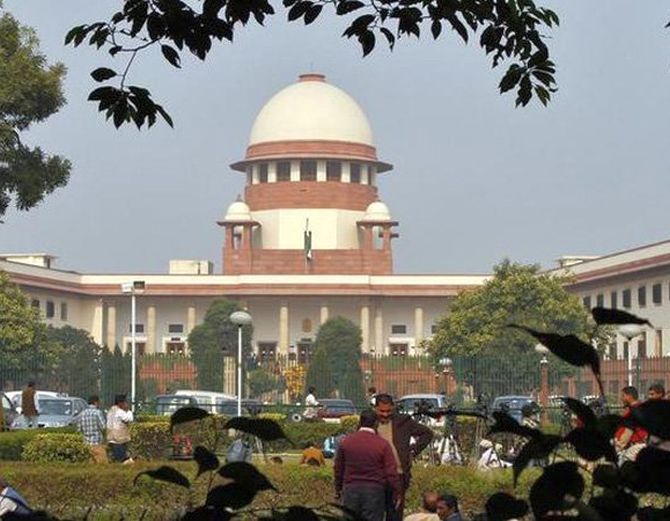 | « Back to article | Print this article |
Muslim parties alleged before the Supreme Court on Monday that questions are asked only from them and not posed to the Hindu side in the politically sensitive Ram Janmabhoomi land dispute case at Ayodhya.

This comment was made by senior advocate Rajeev Dhavan, appearing for the Muslim parties, before a 5-judge Constitution bench headed by Chief Justice Ranjan Gogoi.
"Your Lordship didn't ask question to the other side. All the questions have been asked to us only. Of course, we are answering them." Dhavan told the bench on the 38th day of the crucial hearing in the case.
The submission was vehemently opposed by senior advocate C S Vaidyanathan, representing deity 'Ram Lalla', who said: "This is totally unwarranted".
Former Attorney General and senior advocate K Parasaran, also representing the deity, opposed the claim of Dhavan who created flutter in the packed courtroom by making the claim.
Dhavan's remark came when the bench, which also comprises justices S A Bobde, D Y Chandrachud, Ashok Bhushan and S A Nazeer, said that the idea behind erecting iron railing at the disputed site was to separate the inner courtyard from the outer courtyard.
By putting up an iron railing, the idea was to separate Hindus and Muslims and it was to appreciate the fact that Hindus were offering prayers in the outer-courtyard where 'Ram Chabutra', 'Sita Rasoi', 'Bhandar Grih' were situated, the court said.
The bench also took note of Dhavan's submissions that the Hinuds only had 'prescriptive right' to enter and offer prayer at the site and it does not mean that they had ownership claim over the disputed property.
"As you say they had the right to pray and enter, does it not dilute your right to ownership," the bench asked, adding in case of 'exclusive ownership' over a property, can a third person be allowed entry and prayer right.
The protracted hearing in the case has entered the crucial final leg on Monday as the top court resumed proceedings on the 38th day after the week-long Dussehra break.
At the out set, Dhavan opposed the presence of some non-lawyers near the dais and said that he was pointing it out in his capacity as an officer of the court.
Bharatiya Janata Party leader Subramanian Swamy was also present in the courtroom. The bench, however, did not react.
Dhavan also said that some non-accredited journalists are near the dias despite not being allowed as per the rules and the court should take note of it.
The CJI said he would look into the issue.
Dhavan dealt with the legal principle of adverse possession and limitation law and said the lawsuit filed by Sunni Wakf Board and others on December 18, 1961 was not time barred as the 12 years time period to file the case started on December 22-23, 1949 when the idols were placed under the Central dome of the disputed structure.
In response to a query that if Muslim parties claimed ownership under adverse possession doctrine then it will have to establish that Hindus had the title over property, Dhavan said, "It was a misplaced pleading. I accept this".
He said Muslims had title over the land since 1528 when mosque was built and there have been evidence that Mughals, Nawab of Awadh and then Britishers gave grants and moreover, Hindu parties, from 1885 to 1989, did not claim title.
Dhavan said he was 'cautioning' the bench against re-writing history as lawsuits cannot be decided on the basis of archeological evidence and by deciding whether Babur created a wakf.
Cases have to be decided under legal parameters and courts cannot be persuaded to decide that 500 mosques, built by conquering emperors, be dug up to establish that temples were existing before the mosques, he said.
"We are concerned with the proposition of law and the archeological evidence will not and cannot decide my title over the property," he said, adding "Why knock down one of the domes of the Babri mosque in the 1934 riots and trespass to install the idols of Lord Ram in 1949 if they already had the title...Why did they have to do all this."
He said that Quran, Hadith and other Islamic law cannot be used in 'bits and pieces' to establish that the place was not a valid mosque in view of the fact that Islamic law is 'very complex' and has evolved in last 1500 years.
On the issue of reliefs, he said that the demolition of structure cannot be forgotten and the Sunni Wakf Board had also sought restoration of the status as prevailing on December 5, 1992, a day before the razing of the building.
He then referred to Nobel laureate Amartya Sen to say that India cannot be treated as a 'monolithic entity' and submitted that in West Bengal, Lord ram is not worshipped.
"Please do not refer to all this," the bench said.
He then dealt with submissions of senior lawyer P N Mishra that the mosque was not a valid mosque in the eyes of Quranic and Islamic law and said that Indo-English law would apply in this case and "pick and choose from the Quran and Hadith do not help".
"Aurangazeb was one of the most liberal rulers. Very orthodox, but liberal conqueror. Hindus with limited knowledge cannot determine the fate of this dispute as Islamic law is very complex," Dhavan said.
Dhavan would continue arguments on Tuesday.
14 appeals have been filed in the apex court against the 2010 Allahabad high court judgment, delivered in four civil suits, that the 2.77-acre land in Ayodhya be partitioned equally among the three parties -- the Sunni Waqf Board, the Nirmohi Akhara and Ram Lalla.